Europe is still awaiting the moment of truth
Ralitsa Kovacheva, September 23, 2010
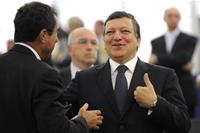 This is Europe’s moment of truth, European Commission President Jose Manuel Barroso said in his first ever State of the Union address to the European Parliament. Barroso appeared to be tensed, although before the parliamentary session he demonstrated friendly relations with the MEPs, chatting with them casually and with a smile. Perhaps this was because of the expected criticism from Parliament, or because of MEPs' dissatisfaction, because were required by group leaders to attend the session under threat of serious fines.
This is Europe’s moment of truth, European Commission President Jose Manuel Barroso said in his first ever State of the Union address to the European Parliament. Barroso appeared to be tensed, although before the parliamentary session he demonstrated friendly relations with the MEPs, chatting with them casually and with a smile. Perhaps this was because of the expected criticism from Parliament, or because of MEPs' dissatisfaction, because were required by group leaders to attend the session under threat of serious fines.
What did Barroso mean by saying "the moment of truth"? As expected, he sent a strong message to Member States that they don't think “European”enough: "Europe must show it is more than 27 different national solutions. We either swim together, or sink separately. We will only succeed if, whether acting nationally, regionally or locally we think European."
This thread was seen throughout Barroso's speech, probably because of MEPs' willingness to hear exactly this. He summarised the current state of the Union, saying that it had “withstood the test” of the crisis and the present was, what mattered. It is important not to comment on what happened and why, but rather - how to bring the Union to the state in which we want it to be, the Commission President stated. He defined five major challenges for the Union for next year:
- dealing with the economic crisis and governance;
- restoring growth and jobs by accelerating Europe 2020 reform agenda;
- building an area of freedom, justice and security;
- launching negotiations for a modern EU budget;
- and increasing EU's weight on global stage.
Understandably, Barroso stressed seriously on economic governance - not only because of its importance, but because this is one of the points on which the Commission can report a complete success – on September 7th the finance ministers gave their final approval for the launch of the European economic semester. Barroso assured MEPs that "the Commission will strengthen its role as independent referee and enforcer of the new rules” - a position on which Parliament especially insists and regularly highlights.
Another topic on which the Commission can boast with success is financial regulation. Barroso recalled what had been done so far and thanked Parliament for the agreement reached in recent days, allowing the creation of the new architecture of European financial supervision. Yet this autumn the Commission will present its proposals on short selling, OTC derivatives, credit rating agencies, bank resolution funds and crisis management [it already did]. Barroso clearly expressed his support for the introduction of a financial transactions tax which the Commission will soon propose.
"The days of betting on someone else’s burning house are over. We continue to insist that banks, not taxpayers, must pay up front to cover the costs of their own risks of failure."
Barroso paid special attention to the single market as an opportunity to stimulate growth and raise employment. “We have very high levels of unemployment but Europe has now 4 million job vacancies. The Commission will propose later this year a "European Vacancy Monitor". It will show people where the jobs are in Europe and which skills are needed. We will also come forward with plans for a European skills passport". Barroso noted also the work needed to relieve small and medium enterprises, particularly in terms of bureaucratic obstacles. Based on the report of the former European Commissioner Mario Monti, this autumn the Commission will present a new Single Market Act and a new industrial policy.
European Commission President did not miss to stress the importance of Europe 2020 strategy with its goals for sustainable growth, more employment and investment in knowledge and innovation.
Perhaps the only news in Barroso's statement was the establishment of "EU 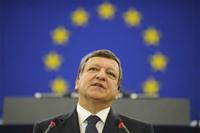 project bonds" as an instrument to finance large infrastructure projects, in the context of seeking new sources of financing of EU's budget. Given the opposition of Parliament against the issuance of euro bonds, obviously Barroso's approach to the subject was successful because there were no critical remarks on the issue.
project bonds" as an instrument to finance large infrastructure projects, in the context of seeking new sources of financing of EU's budget. Given the opposition of Parliament against the issuance of euro bonds, obviously Barroso's approach to the subject was successful because there were no critical remarks on the issue.
Commission's President stressed the need of a common EU energy policy, promising next year the executive to submit an energy action plan, an infrastructure package and an energy efficiency action plan. Europe needs to complete its internal energy market, to build and connect its electricity networks and to ensure energy security and solidarity, Barroso said. He will travel to the Caspian region later this year to promote the Southern Corridor as a means of enhancing Europe's security of supply.
With regard to the common foreign policy, which is a sensitive issue for MEPs, Mr Barroso stressed that the Union has made progress. Strong approval by Parliament, however, won his thesis that "we will not have the weight we need in the world without a common defence policy. I believe now is the moment to address this challenge.”
Barroso did not miss the opportunity to again emphasise that the only way the EU can have a global political role, matching its economic weight, is to act as a whole - as Europe, rather than as 27 separate countries. Barroso promised that “together with High Representative and Vice-President Ashton, I will present our vision of how we can maximise Europe's role in the world. With the European External Action Service, we have the means to match our aspirations. “
The only applause he received, however, was on the topic of human rights. We are working hard to implement the Stockholm action plan, Barroso said. The Commission will bring forward an internal security strategy to tackle threats such as organised crime and terrorism and new proposals on policing EU external borders. In the typical Brussels wording, he commented on the expulsion of Roma from France:
"Europeans will find that their fundamental rights and obligations exist wherever they go. Everyone in Europe must respect the law, and the governments must respect human rights, including those of minorities. Racism and xenophobia have no place in Europe."
Although they clapped rigorously, later the deputies criticised him for not calling things with their real names and that the Commission had not stated clearly that France violated human rights.
In the spirit of the new tone of cooperation and support, reigned between the Commission and Parliament in recent months, Barroso ended his speech with a unique reference to some of Parliament's key demands:
"The secret of Europe's success is its unique Community model. More than ever, the Commission must drive the political agenda with its vision and proposals. I have called for a special relationship between the Commission and Parliament, the two Community institutions par excellence. I am intensifying my political cooperation with you.”
Against the background of the speech itself, which was well measured and clearly consistent with what lawmakers wanted to hear, the criticism of MEPs was also expected - not as to the substance but rather to the lack of unequivocal position of the Commission. It became clear that the main priorities Barroso outlined, are also priorities of Parliament and on some issues he already has MEPs support - for example, on the financial transactions tax.
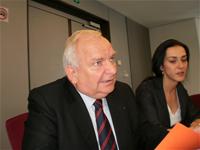 The largest group in Parliament - EPP (to which Barroso himself belongs) made it clear that it supports the introduction of a euro tax as an own resource for EU's budget. Joseph Daul, Chairman of the EPP Group, urged Barroso and the Commission to work towards "more Europe" and together with Parliament to convince Member States that "working together, investing together does not call into question their sovereignty or their prestige”.
The largest group in Parliament - EPP (to which Barroso himself belongs) made it clear that it supports the introduction of a euro tax as an own resource for EU's budget. Joseph Daul, Chairman of the EPP Group, urged Barroso and the Commission to work towards "more Europe" and together with Parliament to convince Member States that "working together, investing together does not call into question their sovereignty or their prestige”.
The leader of the ALDE Group Guy Verhofstadt urged Barroso to complete the 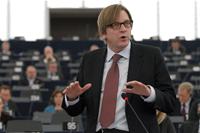 reform of the financial sector and the common economic governance, especially in the euro area, because "a common currency without a common economic policy is nonsense”. Moreover, Verhofstadt stressed that it is very important the European Commission to lead the economic governance, not the task force, led by EU President Herman van Rompuy (it consists of Member States' finance ministers and is believed that its proposals are rather in the spirit of intergovernmentalism, against which MEPs strongly protest). Verhofstadt commented that the desire of some Member States the Community budget to be reduced by 20-30 per cent is ridiculous, instead we should seek to reduce the Member States' contributions and replace them with own sources.
reform of the financial sector and the common economic governance, especially in the euro area, because "a common currency without a common economic policy is nonsense”. Moreover, Verhofstadt stressed that it is very important the European Commission to lead the economic governance, not the task force, led by EU President Herman van Rompuy (it consists of Member States' finance ministers and is believed that its proposals are rather in the spirit of intergovernmentalism, against which MEPs strongly protest). Verhofstadt commented that the desire of some Member States the Community budget to be reduced by 20-30 per cent is ridiculous, instead we should seek to reduce the Member States' contributions and replace them with own sources.
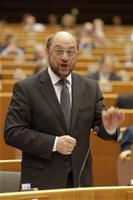 Socialists' leader Martin Schulz stressed, as expected, on social inequalities. He quoted media information about the huge profits of some banks that were unfairly distributed as bonuses, rather than to be invested in a social fund. Therefore, according to Schulz, “a financial transactions tax is something we have to see in the future. If the Commission does not deliver on this, we will use all means available to secure it, including the new citizens' initiative. The banks and especially speculators have to be made pay for the crisis".
Socialists' leader Martin Schulz stressed, as expected, on social inequalities. He quoted media information about the huge profits of some banks that were unfairly distributed as bonuses, rather than to be invested in a social fund. Therefore, according to Schulz, “a financial transactions tax is something we have to see in the future. If the Commission does not deliver on this, we will use all means available to secure it, including the new citizens' initiative. The banks and especially speculators have to be made pay for the crisis".
With the same peremptory tone Schulz warned Barroso: “If you want to combat creeping intergovernmentalism and if you defend the Community method, you can count on us. If you don't, we will hold you responsible at the next State of the Union address".
Most critical Schulz was on the issue of the dominant role of Member States. He accused Barroso that he had made many concessions in his previous, but also in his current mandate and the European governance is led by France and Germany instead of the Commission.
In the same spirit, but more acute, was the statement of the leader of the 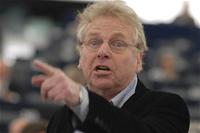 Greens/EFA Daniel Cohn-Bendit, who called Barroso “the absent President of the European Commission”. He accused him of being unable to oppose the will of national governments and protect the European interest; that he was afraid to clearly criticise France for discrimination against Roma; and that he had ignored "the elephant in the room" regarding the financial problems of Greece – the country’s huge and pointless defense budget.
Greens/EFA Daniel Cohn-Bendit, who called Barroso “the absent President of the European Commission”. He accused him of being unable to oppose the will of national governments and protect the European interest; that he was afraid to clearly criticise France for discrimination against Roma; and that he had ignored "the elephant in the room" regarding the financial problems of Greece – the country’s huge and pointless defense budget.
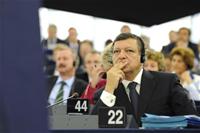 Despite the criticisms, however, the signs indicate otherwise. The Parliament, no matter how unhappy with the "flexible" position of the Commission on the controversial issues appeared, greatly benefits from it in its fight against "intergovernmental approach", namely the Member States to resolve the issues in negotiations with each other and according to national priorities.
Despite the criticisms, however, the signs indicate otherwise. The Parliament, no matter how unhappy with the "flexible" position of the Commission on the controversial issues appeared, greatly benefits from it in its fight against "intergovernmental approach", namely the Member States to resolve the issues in negotiations with each other and according to national priorities.
Forced to balance between Member States and Parliament, Barroso showed that he can keep the balance, and it is no accident that he has been elected for a second term as president of the European Commission. And is no accident either that it was he that made this first ever State of the Union in EU history, not the president Herman van Rompuy - a sign that the Commission has no intents to relinquish its powers, no matter how much it is trying to please everyone.
A sign that Europe’s moment of truth is yet to come.